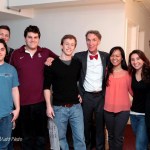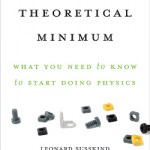
As you may or may not know, I'm currently at work on a book called How to Think Like a Scientist. This raises the fairly obvious question in the post title, namely, why should people think like scientists? What's the point?
In a sense, this is (as Ethan Zuckerman pointed out at lunch the other day) the underlying question at the heart of the whole endeavor of science communication. I mean, I've written two books about modern physics for a general audience, and when I have time, I write this blog aimed at non-scientists. What's the point of doing all that, anyway? What is it I hope to achieve…
OK, Daddy, guess what? Here's my idea. We get a stick of wood and we put a timer on it, then we get a big rock and put it on the end. We have to put feet on the big rock, so it can stand on the stick.
Then when the rain comes down, down, down, we push really hard on the stick. We have to do a really big push, then the rock will go up in the air and come down, and the mountain will grow. Then we measure how much weight it took, and how much damage it did when it hit the ground. With the timer. Which isn't a timer, it's a scale.
That's what we're going to do tomorrow!
SteelyKid's plan for…
I had lunch with Ethan Zuckerman yesterday, and we were talking about technology and communicating science to a mass audience, and Michio Kaku came up. Specifically, the fact that he's prone to saying stuff that's just flat wrong, if not batshit crazy-- see this angry post from 2010 for an example.
It was amusing, then, to return to my RSS reader and find first Sean Carroll and then Matt Strassler expressing outrage and annoyance over some incredibly dumb things Kaku said about the Higgs Boson. My initial reaction was along the lines of "Yeah, welcome to the club," but I suspect that that's…
We're entering the heart of College Admissions Season-- the offers are out, and students are doing the high-stress decision thing-- which means it's time for the New York Times to begin their annual series of faintly awful reports on the state of academia. And right on cue, there's this weekend's article about poor students who excel in high school not applying to top colleges.
To their credit, this at least isn't another article about how very, very hard it is for kids from affluent Connecticut suburbs to decide between several different elite schools. And as someone who grew up in a less…
On Twitter and blogs, we're having another round of complaints about sensationalism and hype in science stories-- Matthew Francis and Gabrielle Rabinowitz are the latest to cross my social media feeds. I've also seen some stories recently (that I'm too lazy to dig up) complaining about the latest Higgs Boson stuff, and I'm sure if you wait ten minutes there'll be a biologist upset about something in Science this week.
The basic form of this is nothing particularly new: the argument is that by representing incremental improvements in science as Revolutionary! Developments! the media are…
The kids are off at Grandma and Grandpa's, so Kate and I went out for a nice dinner Thursday night, and I found myself with a bit of time to blog... but no particular substantive ideas. The whole "publishers behaving badly" theme of last week seems to have run its course, between Random House re-thinking its awful ebook contracts and the whole wrestling-with-pigs argument over paying people to write stuff for the web has kind of exhausted itself. And I don't have the time or energy to write up serious science in detail (it's the last week of classes, and between grading and end-of-term…
What with all the angst lately over the impending death of Google Reader, I finally got over my inertia and am testing out the WordPress auto-tweet feature, because that's apparently how the kids get their blog feeds these days. I sort of hate Twitter feeds that are nothing but blog post links, though, so I've set up a separate account, @PrinciplesBlog for those posts. I'll continue my practice of social-media bombing the occasional blog post that I find particularly worthy of extra attention, but if you want to see absolutely everything, follow the blog account.
This nothingburger of a post…
In the twelve years I've been at Union, there are only two times I've tried to go to an evening speaker and been turned away. Once was 4-5 years ago, when Maya Angelou spoke on campus, the second time was last night, when Bill Nye the Science Guy spoke. I managed to make it to the foot of the steps of Memorial Chapel before they hit the fire code (939, I think they said the number was) and turned everybody away. There were probably 20-30 students behind me in the line, so even if I had made it all the way to the front, I might've stepped aside and let one of them in instead.
It's worth…
SteelyKid has started to demand Sid the Science Kid videos, which of course we are implacably opposed to around here. One of the recent episodes available online was "Slide to the Side," talking about friction. While this partakes a bit of the Feynman "Energy makes it go" problem, it was generally pretty good, and prompted a question from Kate that (combined with Rhett's latest.
Kate and SteelyKid were talking about how friction keeps things from sliding, then Kate asked me whether it would be possible to keep anything at rest on a truly frictionless surface, due to the rotation of the Earth…
WordPress's upload is broken, so here's a link to the photo: SteelyKid and The Pip.
February was... not a good month, in a lot of ways. Let's leave it at that. One of the unfortunate consequences of this was that I went just about the entire month without even taking any pictures of the kids, let along posting any of them here. this was, obviously, a shocking dereliction of duty both as a parent and a blogger.
So, as partial compensation, here's a composite of two pictures (which I'll use as both the "featured image" and insert below, so those reading via RSS can see it without clicking…
There was a lot of re-sharing yesterday of an article about the "Finkbeiner Test" to be applied to profiles of women scientists. This is analogous to the "Bechdel Test" in pop culture, which asks "Do two women talk to each other about something other than a man?", only because we're scientists, it's more complicated, hitting seven points:
To pass the Finkbeiner test, the story cannot mention
The fact that she’s a woman
Her husband’s job
Her child care arrangements
How she nurtures her underlings
How she was taken aback by the competitiveness in her field
How she’s such a role model for other…
One of the things that's been rattling around in my head since ScienceOnline back in January is the need for a greater diversity of voices in science communication generally. I don't mean diversity in the sense of racial and gender make-up of the people doing the communication, though that would be nice, I mean a greater diversity in the way people talk about science.
This started bugging me in the panel that led to the "Journosplain" image that I'm somewhat unfairly tagging as the "featured image" for this post (grabbed from here)-- somewhat, because it's not really Carl Zimmer's fault. But…
In rapid succession yesterday, Twitter threw me two how-to-behave-online links that kind of rubbed me the wrong way. The first was a widely re-shared essay titled You Are Boring:
You listen to the same five podcasts and read the same seven blogs as all your pals. You stay up late on Twitter making hashtagged jokes about the event that everyone has decided will be the event about which everyone jokes today. You love to send withering @ messages to people like Rush Limbaugh—of course, those notes are not meant for their ostensible recipients, but for your friends, who will chuckle and retweet…
This is the physics book that's generating the most buzz just at the moment, by noted string theorist Leonard Susskind and George Hrabovsky, based on a general-audience course Susskind's been running for years. It's doing very well, with an Amazon rank in the 300's, which is kind of remarkable for a book with this many equations. Using calculus, even.
Odd though it might seem given the mathematical content, this is a book that has a lot in common with Cox and Forshaw's Why Does E=Mc2?. By which I mean that it sets out to present a very particular take on theoretical physics to a general…
Every now and then, I run across a couple of items that tie together a whole bunch of different issues that weigh heavily on my mind. That happened yesterday courtesy of Timothy Burke, whose blog post about an NPR story is so good that there aren't enough +1 buttons on the entire Internet for it.
The NPR piece is about eating and exercise habits, and the way families struggle to do what they know they ought to:
More than half of children ate or drank something during the "crunch time" window that can lead to unhealthy weight gain, as perceived by their parents. And more than a quarter of…
Over in Twitter-land, Ben Lillie of the Story Collider asked an interesting question, which sparked some discussion that he's Storified on a Tumblr blog (just in case the date stamp wasn't enough to mark this as 2013...). The original question was:
Partly I’m wondering if there is a reason to have an event series for “other scientists,” but also wondering about the bigger question: is there something about being a scientist that makes it easier to understand other bits of science? I suspect the answer is “a bit,” but really want to know specifically what one could say to scientists they…
We've got calls out to the local grad programs, and I've mentioned this on Twitter a couple of times, but it can't hurt anything to post it here as well: we've got a huge overabundance of first-year engineering students that is forcing us to open extra sections of our intro physics classes to accommodate them. The problem is, we don't have people to teach the new sections. Thus, we are looking for an adjunct to take one section of intro physics or introductory astronomy labs, starting in April and running through mid-June.
If you're within convenient distance of Schenectady, NY, and might be…
This past weekend, I was at Boskone, where I appeared on a few science-y panels. One of these was on the possibility of beaming power down from space:
Energy From Space
Beam me down some juice, Scotty? Let's talk about the possibilities -- and practicalities -- of really long-distance power transmission.
Tom Easton (M), Jordin T. Kare, Chad Orzel, Jeff Hecht, Joan Slonczewski
This was a little odd, as Jordin does this for a living-- he's been working on a proposal to NASA for a solar power generating satellite that would use lasers to beam power down to photovoltaic panels on the ground--…
Yesterday's post about differences between intro physics and chemistry sparked an interesting discussion in comments that I didn't have time to participate in. Sigh. Anyway, a question that came up in there was why we have physicists teach intro physics courses that are primarily designed to serve other departments.
It's a good question, and in my more cynical moments, I sort of suspect it's because engineering faculty are canny enough to outsource the weeding-out of the students who can't hack it in engineering. But I think there are good reasons, particularly at a liberal arts school like…
Not long ago, I had a meeting with the Dean, who is a chemist. One of the things I talked about was my plan for distributing teaching assignments in the next few years, which ran into an interesting cultural difference. I explained how I was trying to make the distribution of assignments a little more regular and uniform, getting everybody to teach both intro and upper-level courses, and he said (paraphrased), "That's funny. We never have a problem with that in chemistry-- the organic chemists teach Orgo, and the rest of us teach general chemistry, and that's that."
It took me a minute to put…






